‘Boys in the Band’: Joe Mantello and Zachary Quinto on the redemption of a notorious gay play
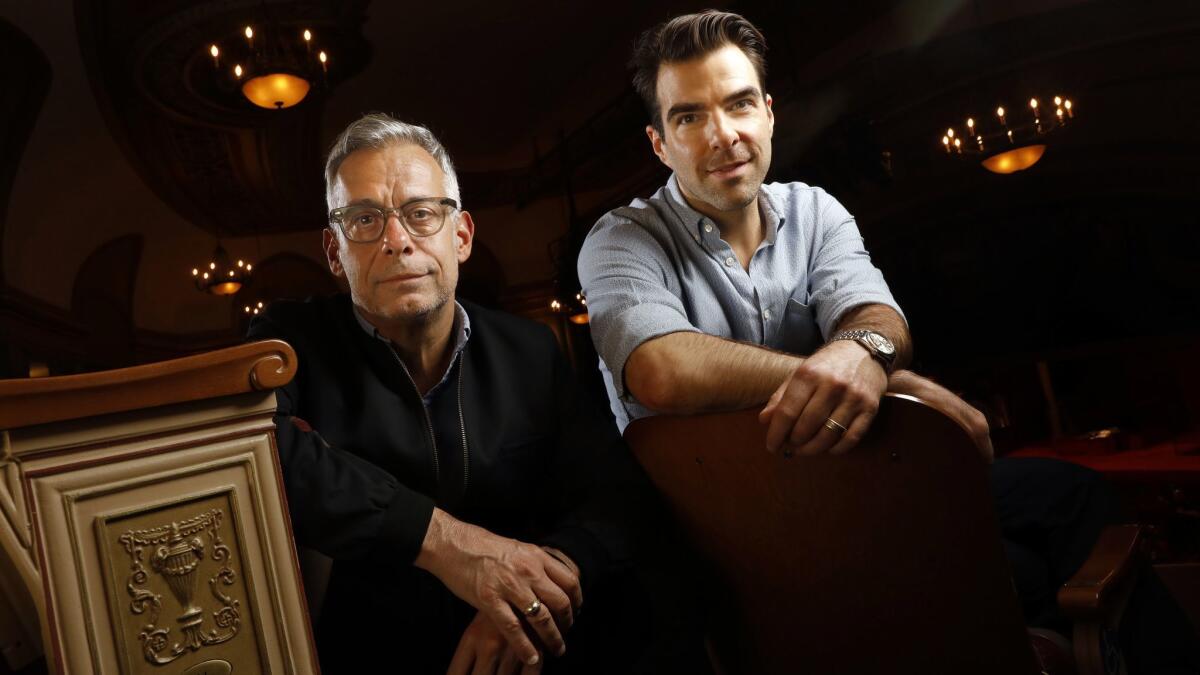
Wait long enough and the unthinkable can happen.
The big surprise isn’t that Mart Crowley’s game-changing gay drama, “The Boys in the Band,” is having its Broadway premiere 50 years after it was first produced off-Broadway. The spectacular development is that the play is being presented by a creative team composed of some of the most powerful openly gay men in the entertainment industry, including producer Ryan Murphy, director Joe Mantello and a cast that includes Zachary Quinto and Jim Parsons.
This is the first time Mantello, a two-time Tony winner who’s up for another Tony this Sunday for his direction of Edward Albee’s “Three Tall Women,” and Quinto, the modern-day Spock who has been gracefully balancing blockbuster and indie projects, have worked together. But their theater paths have curious parallels.
In addition to being one of the most sought-after Broadway directors, Mantello (whose production of “The Humans” opens June 20 at the Ahmanson Theatre) is an actor of striking power. He was nominated for a Tony for his performance as Louis in the original Broadway production of Tony Kushner’s “Angels in America,” a role that Quinto memorably put his stamp on in Michael Greif’s 2010 off-Broadway revival.
Another character Mantello and Quinto have in common is Tom from Tennessee Williams’ “The Glass Menagerie.” Quinto was in the 2013 Broadway revival directed by John Tiffany that starred Cherry Jones. Mantello was in last year’s Broadway revival directed by Sam Gold that starred Sally Field.
In this edited conversation, which took place in the downstairs lobby of the Booth Theatre during early previews, Mantello and Quinto discuss the glories and perils of bringing back “The Boys in the Band” while trading insights on acting in watersheds of gay drama that are also masterpieces of 20th century American playwriting.
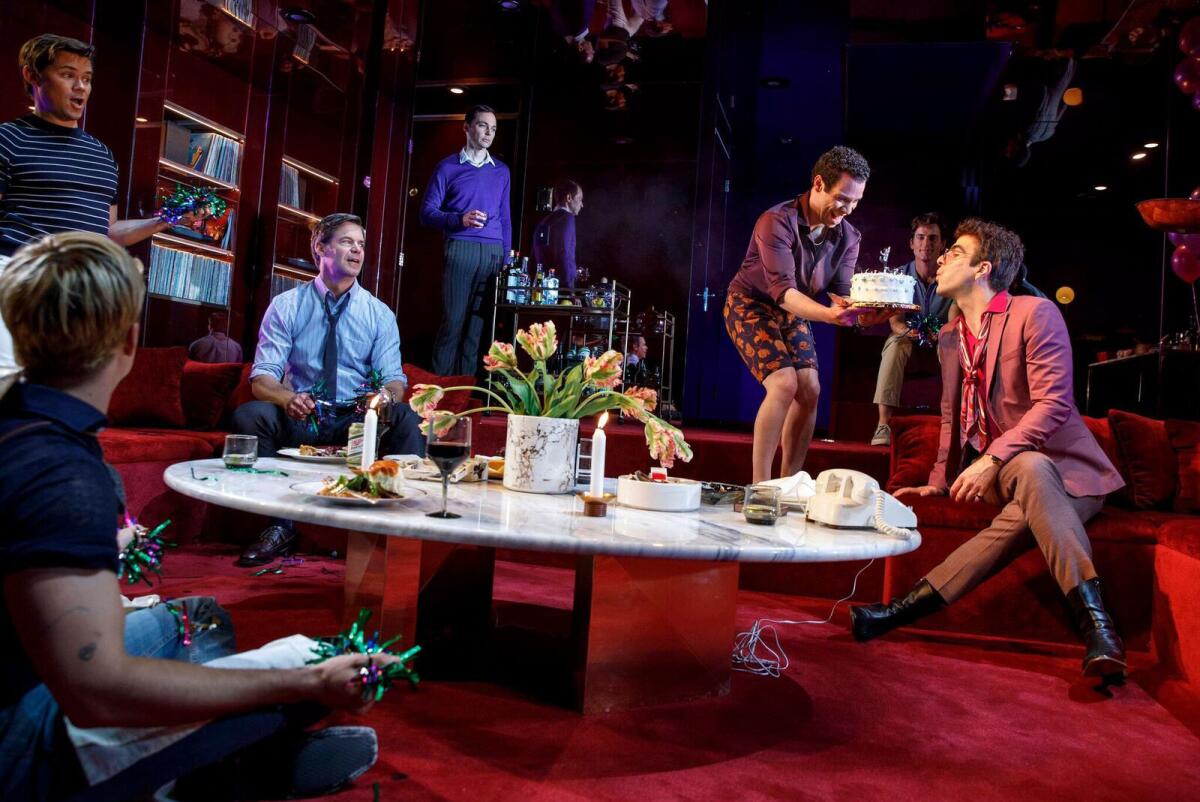
TONY AWARDS: Key races to watch and frontrunners to beat »
“The Boys in the Band” broke ground in its depiction of gay lives, yet from the beginning, there was criticism about the prevalence of stereotypes and the way it confirmed for some theatergoers the unhappiness of “that lifestyle.” Did you have any fears about reviving the play?
Quinto: I did, for sure. We entered into this process first as a reading and then months later as a workshop. I don’t think Joe was entirely convinced that it was what he was going to work on either, but he had much more of an openness to it. I came to the table with a bit of a dismissive attitude. I’ve never seen the movie. I’ve never seen the play. So I think I was under the influence of the stigmas that attached to the work over the years. During the time the play opened and the movie was released, Stonewall happened and what was a revolutionary, unprecedented exploration of the gay male psyche became a reductive and somewhat backward looking romp through these characters’ lives. I wasn’t sure for a while, but then Joe decided he was going to do it. Without putting pressure, he illuminated the reasons for himself, and I just knew at that point, I’d be a fool not to come along for the ride.
Mantello: Ryan Murphy called me with the idea of doing the play. I guess like you, Zach, my immediate response was skepticism. Based in what, I didn’t know because I hadn’t seen the movie in a very long time. But I had seen some other productions, which felt relegated to camp. But Ryan said to read it like an Albee play, and I was really astonished at how beautifully crafted the play is. And then we started talking about different actors, and I started to get really excited.
The AIDS epidemic changed the theatrical conversation. What do you think can be learned from returning to the discussion about internalized homophobia that “Boys” daringly sparked?
Mantello: I’ve come to think that it’s lazy to dismiss this play as about eight or eight-and-a-half self-loathing gay men. I don’t see that. I see one. And I see some people who are up against some pretty tricky stuff. It’s interesting that the gay men in the play are recipients of the scorn and not the society they existed in. Of course they’re a product of their time, but to me, one of the most amazing parts of the play is the couple, Hank and Larry. I don’t know if you feel this onstage, Zach, the way the audience is rooting for them as a couple even though what you’re experiencing is their spikiness with one another. And that’s because there’s a possibility now of gay marriage.
Quinto: That ultimate interaction between Hank and Larry gets me every night. It’s so beautiful and so affirming in terms of their commitment and their willingness to work it out. No relationship is easy. No gay relationship is easy for sure. And these two guys, in the face of all this social resistance and bigotry and hatred are still willing to get in there and figure it out. I agree with you. I think it’s one of the most moving parts of the play.
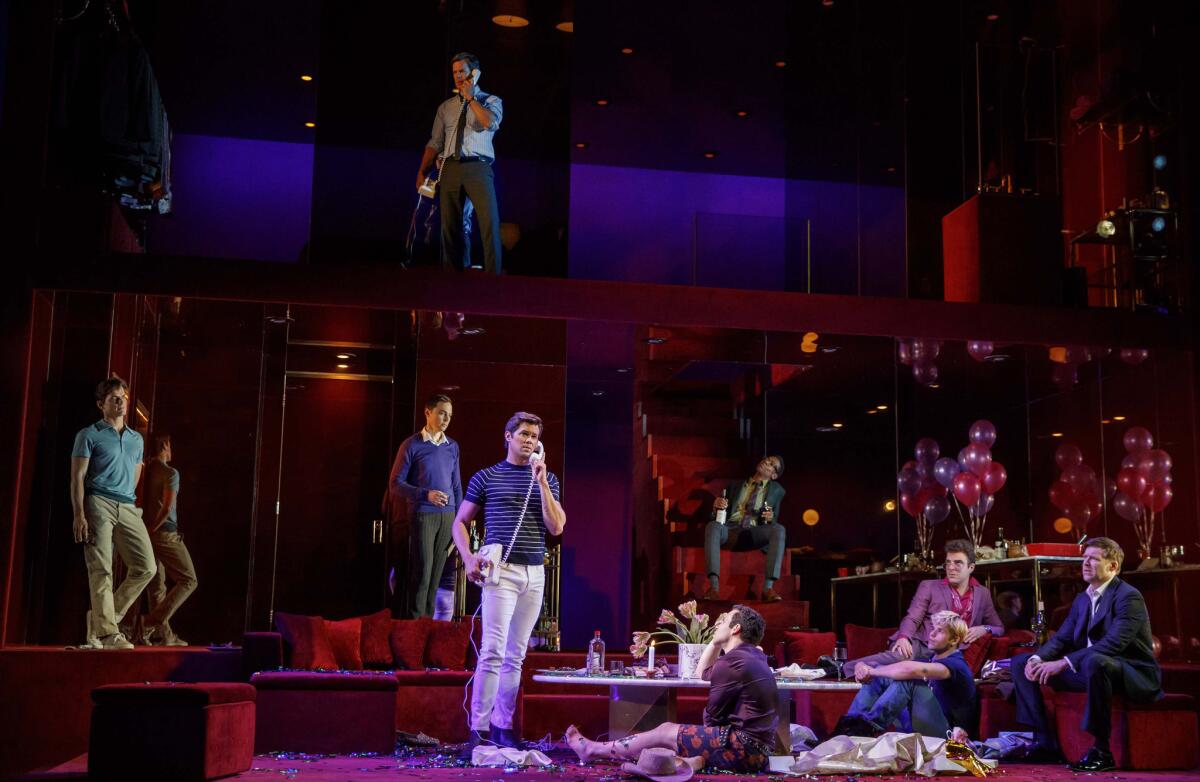
TONY AWARDS: Lauren Ambrose on finding a new voice for ‘My Fair Lady’ »
I was a little surprised to hear you were playing Harold, Zach. Maybe because he has so many issues about his pockmarked appearance and, well, you’re a handsome movie star.
Quinto: Almost all of us read the roles we’re playing in the reading and workshop. Now that we’re doing it, I can’t imagine any other version. Of all the characters, Harold is the most aware of himself and the most at ease with how much he hates himself. He’s transformed self-loathing into a kind of power. It’s been incredibly empowering to do this play for similar reason. The aspects of myself I’ve been least comfortable with are given space and light.
I watched the film again for the first time in ages and was startled by some of the racist banter. Did you have to make any cuts to the play?
Mantello: This is definitely still a part of the play. Not to the extent that it was originally, but I don’t think we pull any punches
Quinto: Definitely not
Mantello: What’s interesting is that other than Michael, the person who shoulders that burden of making racist jokes is Emory, and now we have Robin de Jesús playing Emory, so it’s interesting how that casting changes the relationship. But to answer your question, we did make cuts. We do it straight through without the intermission. The play is still relevant. But, and I think Mart would agree, playwriting has advanced significantly from 50 years ago. So a lot of the stuff we cut are the things an audience in 1968 would need, the exposition. Now the party gets into motion a little bit faster. I actually went back and watched the film to see how they translated it for the screen and it’s sort of based on that.
Quinto: There’s something incredibly momentous about this production. The core people who have come together to make this work are being declarative in their authentic selves. It’s a cumulative result of generations of sacrifice. None of us take the significance of this 50th anniversary production for granted.
Mantello: On the night of the first preview, the most moving part of it was when all nine of you stepped forward for that final bow. It was just astonishing to see these nine gay men who had done this play saying, “Here we are.” It was powerful in a way that I don’t think I was expecting.
Zach, coming out doesn’t seem to have negatively affected your standing in Hollywood, which was one of the main things holding actors back in the past.
Quinto: I’ve had incredible opportunities. Are they the same opportunities I would have had if I had stayed in the closet? Who knows? But I wasn’t interested in those opportunities because it meant that I would have had to sacrifice who I am. At a certain point, I was absolutely incapable of that level of lying to myself.
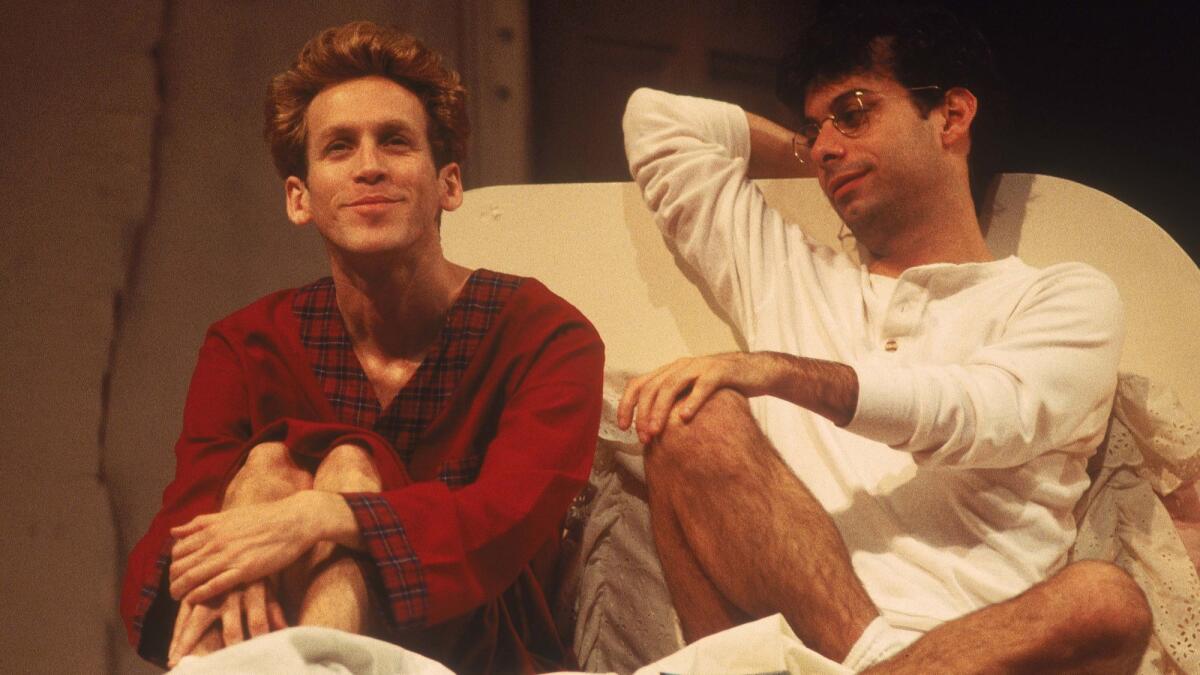
TONY AWARDS: Lindsay Mendez's long road to her 'Carousel' nomination »
What’s it like to be doing “Boys in the Band” when “Angels in America,” a play you both know intimately well, and arguably the greatest gay drama ever written, is back on Broadway and nominated for 11 Tony Awards?
Mantello: Seeing the production in London at the National was a surreal experience. Like any great piece of art that can sustain multiple interpretations, different things come into focus and other things recede. The thing that really blew my mind was that it was the first time I ever really understood what the hell the angel was talking about. That whole plot line has been elusive to me since the day I was in it. I was in those heaven scenes, and I couldn’t tell you what they were about. I think it’s a tribute to them, it’s my age, it’s a lot of things. People have often said that “Perestroika” is the messier of the two parts but the more interesting play. [Director] George Wolfe said that all the time. I never got that until I saw the National production.
Did knowing Tony Kushner influence at all how you played Louis?
Quinto: There are strong currents of Tony in all the characters but none so distilled as in Louis. He was very involved in our production, so I would draw on my observation of him in conversation with other people. But then he and Michael Greif are incredibly close collaborators, so he was involved in our discussions on what a scene should be. We were incredibly lucky to have the opportunity to go out as a company the other night and talk to Mart Crowley.
How old is Crowley now?
Mantello: 82
Quinto: We had a conversation about the actual man on whom Harold is based. Any time you’re able to engage a playwright is a unique gift for an actor.
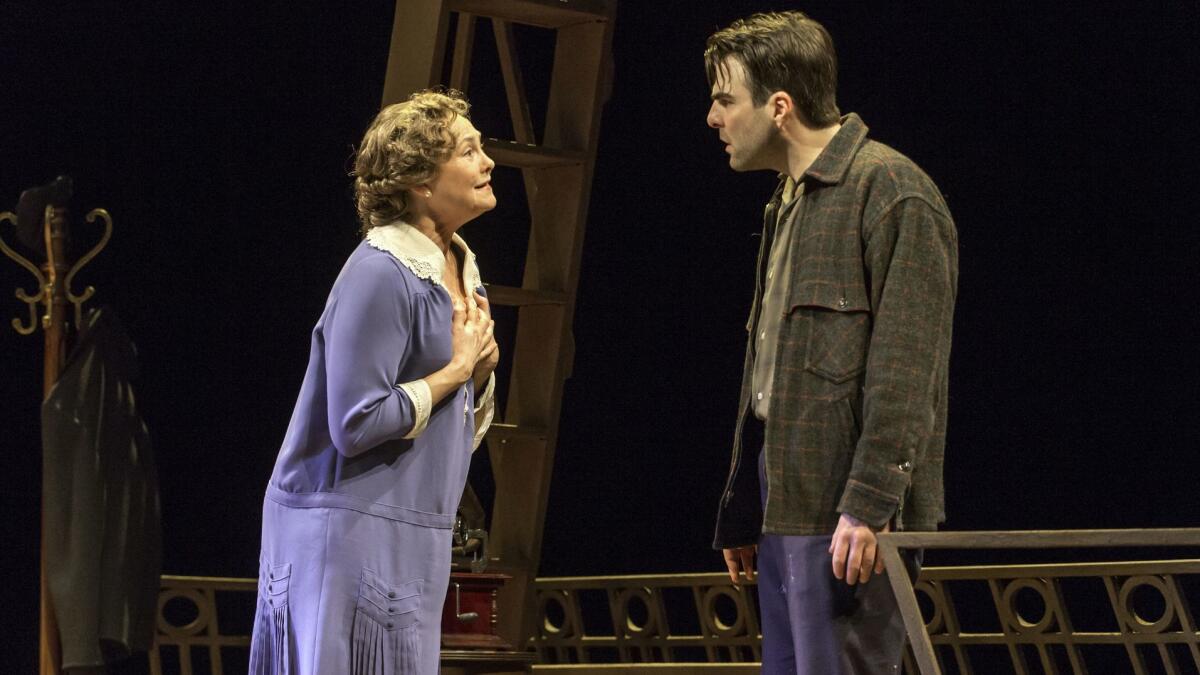
Both of you took a more openly gay approach to portraying Tom. Do you see “The Glass Menagerie” as part of the lineage of gay drama?
Mantello and Quinto: Yes!
Quinto: The greatest joy for me in doing “The Glass Menagerie” was this sense of connection I felt [with] Tennessee Williams. Tom is torn between his ambition and his creativity. His decision to just cut and run was so powerful to me. It was my personal connection to the material, my relationship with my mother and how that has played out in my life. It was a very cathartic experience.
Mantello: My reasons for doing the play were more about artistic growth. I wanted to be in a room with Sam Gold. We have very different metabolisms as directors. I get to be in a room with other actors, but I never, or very rarely, get the chance to be in a room with another director. And I so admired his work that I thought that’s enough of a reason to try this. Because at first, when I told a friend that they wanted me to play Tom in “Glass Menagerie,” the response was “Who’s playing Laura, Estelle Parsons?”
[Laughter] You’re not that old!
Mantello: Thank you. Zach, I found it incredibly difficult to memorize — the monologues, in particular. Did you have that problem?
Quinto: No, I didn’t. We talked about this a little — what is the version of Tom that’s talking to the audience instead of the version that’s talking to Amanda, Laura and Jim. I guess I felt like I understood that in my life. I had to make choices to pursue my own ambitions over pursuing those things that maybe other people wanted me to choose, so there was something about the haunting of Tom that I really got. And it wasn’t sad to me. It was actually really beautiful. And Cherry is just in that direct line to Colleen Dewhurst, Julie Harris — the grand dames of the theater! We were all on this great journey together.
Mantello: If I walk out on the stage at 54, as I was at the time, and I’m still telling this story, that is a different story. It’s the story of a person who is haunted to the point that he’s not liberated. I felt you leaving in some way liberated that spirit. But I felt that there was no other way for me to approach the material other than if I’m still telling this story 30 years later, I’m going to keep coming out every night because I can’t not tell it.
Quinto: I think there was something much more anchored to the memory aspect of the play in our production. It was much more about the lyricism of memory —
Mantello: And the magic
Quinto: Your production was much more —
Mantello: Concrete. It was harsh.
Quinto: Yes, yes.
Mantello: It was really harsh.
Quinto:. But that’s the great thing about a play like that —
Mantello: That’s the amazing thing —
That the work is so flexible?
Mantello: I would use the word sturdy. They can take so much. That’s the thrilling thing for me. I absolutely do not agree that there is one way to do those plays. I just don’t.
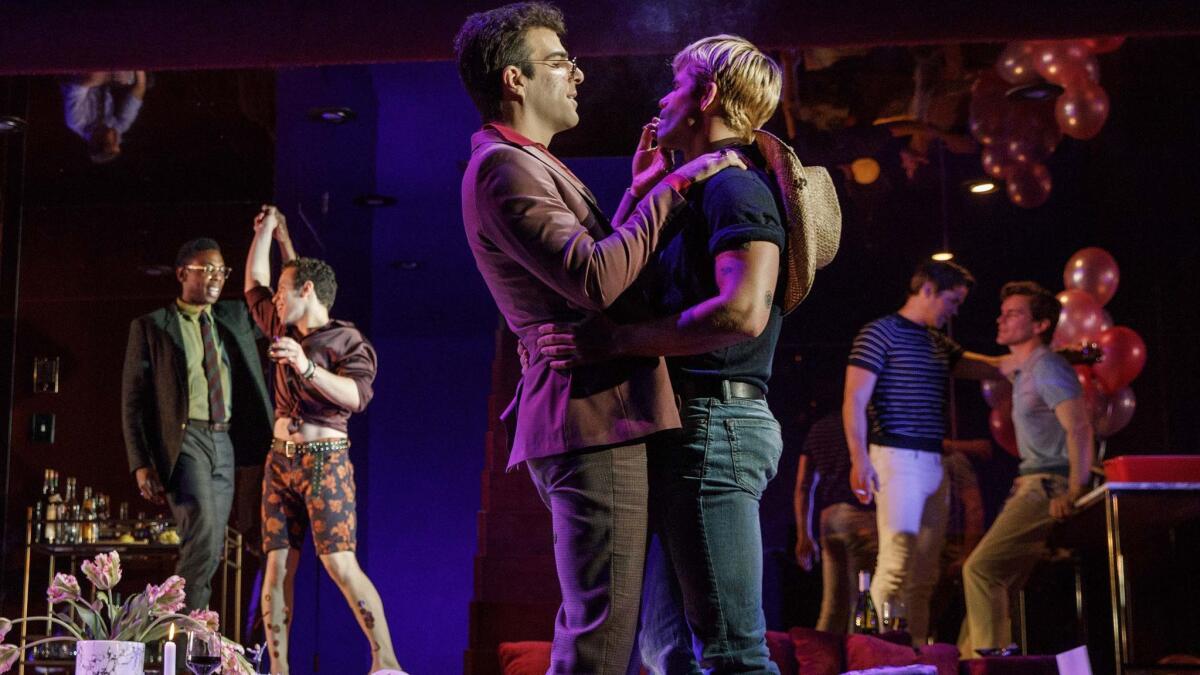
It’s an indication of how far we’ve come that we can acknowledge Williams’ sexual identity without letting that knowledge dominate all other aspect of the work.
Mantello: Well, it’s partly because of what we know now — that he was getting laid all over all the place. In the play, Amanda says that the movies don’t let out so late, so where’s Tom going? You have to make a choice about where he’s going.
We’ve been talking about three landmark works by white gay men. Are you concerned that Broadway is offering only a narrow definition of what it means to be LGBTQ?
Mantello: I don’t make a determination about what gets produced. I’m not passing the buck. I have a responsibility to diversity onstage, but one of the things I’ve heard about our production of “Boys” is that it’s a bunch of white guys. Well, race is a component of this play. You can’t just drop people in willy-nilly and say, “Well, we’re going for diversity.” Maybe I’m narrow minded but …
Quinto: Not in a play that takes place in 1968 and is about social-psychological dynamics of which race was an enormous part.
Mantello: One character is the recipient of some pretty horrendous insults, but if there’s another black male character on the stage then, as an audience member, I don’t understand the math of that.
But you’ve tried to open up the play in some ways?
Mantello: I think having Emory played by an actor of color makes complete sense to me. He also happens to be a brilliant actor, so it’s not tokenism, which to me is troubling.
Quinto: There’s an unstoppable movement right now toward integration and equality that is giving voice to new artists that might not have had opportunities to tell their stories in the way they are now. But I also think when you’re doing a revival of a play that had specific social structures in place you have to honor the play. Serving the text is the job of the theater. I’m not advocating that those are the only stories that are told, but I think when you’re telling a story for which that is true, you have to be true to that story
Who are the gay writers today who are offering reflections on what it means to be LGBTQ in 2018?
Quinto: Matthew Lopez is a playwright whose work I’m familiar with and who I respect a great deal. I think he’s bringing a contemporary voice of this younger generation into the mainstream. Who else?
Mantello: I don’t think of it in those terms. I don’t think of gay writers. I mean if you were to say to me who are the straight writers, well, you wouldn’t ask me that question. So for me to identify a little tribe of gay writers, I don’t know.
Quinto: But talking about gay writers is different from talking about bringing gay stories to the stage
Mantello: But that’s not exclusively the job of gay writers. In “The Humans,” there’s a gay character, and the fact that she’s gay is probably the least interesting thing about her. So I think for this new generation, those definitions aren’t so hard and fast. And I think that’s a great thing.
Follow me @charlesmcnulty
The biggest entertainment stories
Get our big stories about Hollywood, film, television, music, arts, culture and more right in your inbox as soon as they publish.
You may occasionally receive promotional content from the Los Angeles Times.








